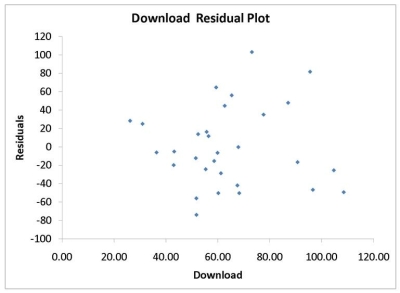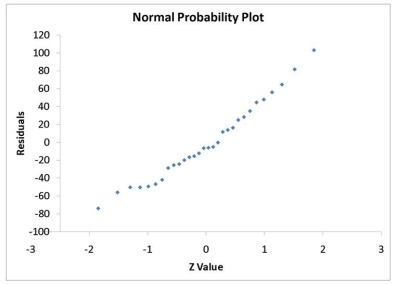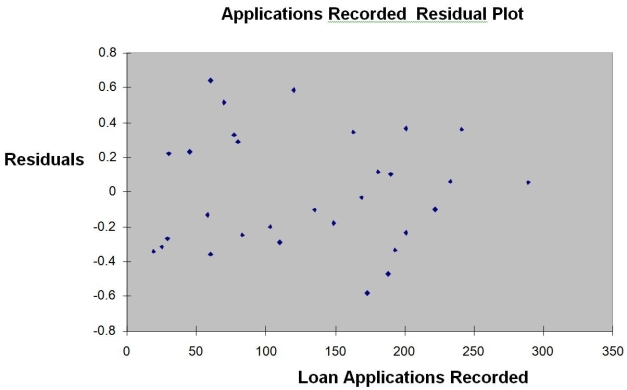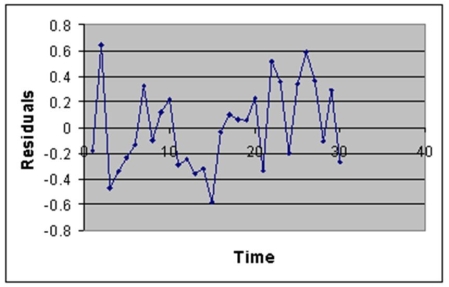Exam 13: Simple Linear Regression
Exam 1: Introduction145 Questions
Exam 2: Organizing and Visualizing Data210 Questions
Exam 3: Numerical Descriptive Measures153 Questions
Exam 4: Basic Probability171 Questions
Exam 5: Discrete Probability Distributions218 Questions
Exam 6: The Normal Distribution and Other Continuous Distributions191 Questions
Exam 7: Sampling and Sampling Distributions197 Questions
Exam 8: Confidence Interval Estimation196 Questions
Exam 9: Fundamentals of Hypothesis Testing: One-Sample Tests165 Questions
Exam 10: Two-Sample Tests210 Questions
Exam 11: Analysis of Variance213 Questions
Exam 12: Chi-Square Tests and Nonparametric Tests201 Questions
Exam 13: Simple Linear Regression213 Questions
Exam 14: Introduction to Multiple Regression355 Questions
Exam 15: Multiple Regression Model Building96 Questions
Exam 16: Time-Series Forecasting168 Questions
Exam 17: Statistical Applications in Quality Management133 Questions
Exam 18: A Roadmap for Analyzing Data54 Questions
Select questions type
TABLE 13-11
A computer software developer would like to use the number of downloads (in thousands) for the trial version of his new shareware to predict the amount of revenue (in thousands of dollars) he can make on the full version of the new shareware. Following is the output from a simple linear regression along with the residual plot and normal probability plot obtained from a data set of 30 different sharewares that he has developed:
Regression Statistics Multiple R 0.8691 R Square 0.7554 Adjusted R Square 0.7467 Standard Error 44.4765 Observations 30.0000
df SS MS F Significance F Regression 1 171062.9193 171062.9193 86.4759 0.0000 Residual 28 55388.4309 1978.1582 Total 29 226451.3503
Coefficients Standard Error t Stat P-value Lower 95\% \multicolumn 1 r Upper 95\% Intercept -95.0614 26.9183 -3.5315 0.0015 -150.2009 -39.9218 Download 3.7297 0.4011 9.2992 0.0000 2.9082 4.5513

 -Referring to Table 13-11, what is the standard deviation around the regression line?
-Referring to Table 13-11, what is the standard deviation around the regression line?
(Short Answer)
5.0/5  (40)
(40)
TABLE 13-13
In this era of tough economic conditions, voters increasingly ask the question: "Is the educational achievement level of students dependent on the amount of money the state in which they reside spends on education?" The partial computer output below is the result of using spending per student ($) as the independent variable and composite score which is the sum of the math, science and reading scores as the dependent variable on 35 states that participated in a study. The table includes only partial results.
Regression Statistics Multiple R 0.3122 R Square 0.0975 Adjusted R 0.0701 Square Standard 26.9122 Error Observations 35
df SS MS F Regression 1 2581.5759 Residual 724.2674 Total 34 26482.4000
Coefficients Standard Error t Stat P-value Intercept 595.540251 22.115176 Spending per Student () 0.007996 0.004235
-Referring to Table 13-13, the value of the F test on whether spending per student affects composite score is ________.
(Short Answer)
4.9/5  (34)
(34)
TABLE 13-2
A candy bar manufacturer is interested in trying to estimate how sales are influenced by the price of their product. To do this, the company randomly chooses 6 small cities and offers the candy bar at different prices. Using candy bar sales as the dependent variable, the company will conduct a simple linear regression on the data below: River Falls 1.30 100 Hudson 1.60 90 Ellsworth 1.80 90 Prescott 2.00 40 Rock Elm 2.40 38 Stillwater 2.90 32
-Referring to Table 13-2, what percentage of the total variation in candy bar sales is explained by prices?
(Multiple Choice)
4.9/5  (30)
(30)
TABLE 13-12
The manager of the purchasing department of a large saving and loan organization would like to develop a model to predict the amount of time (measured in hours) it takes to record a loan application. Data are collected from a sample of 30 days, and the number of applications recorded and completion time in hours is recorded. Below is the regression output:
Regression Statistics Multiple R 0.9447 R Square 0.8924 Adjusted R 0.8886 Square Standard 0.3342 Error Observations 30
df SS MS F Significance F Regression 1 25.9438 25.9438 232.2200 4.3946-15 Residual 28 3.1282 0.1117 Total 29 29.072
Coefficients Standard Error t Stat P -value Lower 95\% Upper 95\% Intercept 0.4024 0.1236 3.2559 0.0030 0.1492 0.6555 Applications Recorded 0.0126 0.0008 15.2388 4.3946-15 0.0109 0.0143
Note: 4.3946E-15 is 4.3946*10^-15

 -Referring to Table 13-12, the estimated mean amount of time it takes to record one additional loan application is
-Referring to Table 13-12, the estimated mean amount of time it takes to record one additional loan application is
(Multiple Choice)
4.9/5  (48)
(48)
TABLE 13-5
The managing partner of an advertising agency believes that his company's sales are related to the industry sales. He uses Microsoft Excel to analyze the last 4 years of quarterly data (i.e., n = 16) with the following results:
Regression Statistics
Multiple R 0.802 R Square 0.643 Adjusted R Square 0.618 Standard Error SYX 0.9224 Observations 16
ANOVA
df SS MS F Sig.F Regression 1 21.497 21.497 25.27 0.000 Error 14 11.912 0.851 Total 15 33.409
p -value Intercept 3.962 1.440 2.75 0.016 Industry 0.040451 0.008048 5.03 0.000
Durbin-Watson Statistic
-Referring to Table 13-5, the partner wants to test for autocorrelation using the Durbin-Watson statistic. Using a level of significance of 0.05, the decision he should make is
(Multiple Choice)
5.0/5  (36)
(36)
TABLE 13-12
The manager of the purchasing department of a large saving and loan organization would like to develop a model to predict the amount of time (measured in hours) it takes to record a loan application. Data are collected from a sample of 30 days, and the number of applications recorded and completion time in hours is recorded. Below is the regression output:
Regression Statistics Multiple R 0.9447 R Square 0.8924 Adjusted R 0.8886 Square Standard 0.3342 Error Observations 30
df SS MS F Significance F Regression 1 25.9438 25.9438 232.2200 4.3946-15 Residual 28 3.1282 0.1117 Total 29 29.072
Coefficients Standard Error t Stat P -value Lower 95\% Upper 95\% Intercept 0.4024 0.1236 3.2559 0.0030 0.1492 0.6555 Applications Recorded 0.0126 0.0008 15.2388 4.3946-15 0.0109 0.0143
Note: 4.3946E-15 is 4.3946*10^-15

 -Referring to Table 13-12, the value of the measured t test statistic to test whether the amount of time depends linearly on the number of loan applications recorded is
-Referring to Table 13-12, the value of the measured t test statistic to test whether the amount of time depends linearly on the number of loan applications recorded is
(Multiple Choice)
4.8/5  (46)
(46)
Assuming a linear relationship between X and Y, if the coefficient of correlation (r)equals -0.30,
(Multiple Choice)
4.8/5  (34)
(34)
TABLE 13-3
The director of cooperative education at a state college wants to examine the effect of cooperative education job experience on marketability in the work place. She takes a random sample of 4 students. For these 4, she finds out how many times each had a cooperative education job and how many job offers they received upon graduation. These data are presented in the table below. Student CoopJobs JobOffer 1 1 4 2 2 6 3 1 3 4 0 1
-Referring to Table 13-3, the least squares estimate of the slope is ________.
(Short Answer)
4.9/5  (36)
(36)
TABLE 13-11
A computer software developer would like to use the number of downloads (in thousands) for the trial version of his new shareware to predict the amount of revenue (in thousands of dollars) he can make on the full version of the new shareware. Following is the output from a simple linear regression along with the residual plot and normal probability plot obtained from a data set of 30 different sharewares that he has developed:
Regression Statistics Multiple R 0.8691 R Square 0.7554 Adjusted R Square 0.7467 Standard Error 44.4765 Observations 30.0000
df SS MS F Significance F Regression 1 171062.9193 171062.9193 86.4759 0.0000 Residual 28 55388.4309 1978.1582 Total 29 226451.3503
Coefficients Standard Error t Stat P-value Lower 95\% \multicolumn 1 r Upper 95\% Intercept -95.0614 26.9183 -3.5315 0.0015 -150.2009 -39.9218 Download 3.7297 0.4011 9.2992 0.0000 2.9082 4.5513

 -Referring to Table 13-11, what is the p-value for testing whether there is a linear relationship between revenue and the number of downloads at a 5% level of significance?
-Referring to Table 13-11, what is the p-value for testing whether there is a linear relationship between revenue and the number of downloads at a 5% level of significance?
(Short Answer)
4.8/5  (34)
(34)
What do we mean when we say that a simple linear regression model is "statistically" useful?
(Multiple Choice)
5.0/5  (34)
(34)
TABLE 13-10
The management of a chain electronic store would like to develop a model for predicting the weekly sales (in thousands of dollars) for individual stores based on the number of customers who made purchases. A random sample of 12 stores yields the following results:
Customers Sales (Thousands of Dollars) 907 11.20 926 11.05 713 8.21 741 9.21 780 9.42 898 10.08 510 6.73 529 7.02 460 6.12 872 9.52 650 7.53 603 7.25
-Referring to Table 13-10, what are the degrees of freedom of the t test statistic when testing whether the number of customers who make a purchase affects weekly sales?
(Short Answer)
4.8/5  (38)
(38)
TABLE 13-5
The managing partner of an advertising agency believes that his company's sales are related to the industry sales. He uses Microsoft Excel to analyze the last 4 years of quarterly data (i.e., n = 16) with the following results:
Regression Statistics
Multiple R 0.802 R Square 0.643 Adjusted R Square 0.618 Standard Error SYX 0.9224 Observations 16
ANOVA
df SS MS F Sig.F Regression 1 21.497 21.497 25.27 0.000 Error 14 11.912 0.851 Total 15 33.409
p -value Intercept 3.962 1.440 2.75 0.016 Industry 0.040451 0.008048 5.03 0.000
Durbin-Watson Statistic
-Referring to Table 13-5, the value of the quantity that the least squares regression line minimizes is ________.
(Short Answer)
4.9/5  (41)
(41)
Showing 201 - 213 of 213
Filters
- Essay(0)
- Multiple Choice(0)
- Short Answer(0)
- True False(0)
- Matching(0)